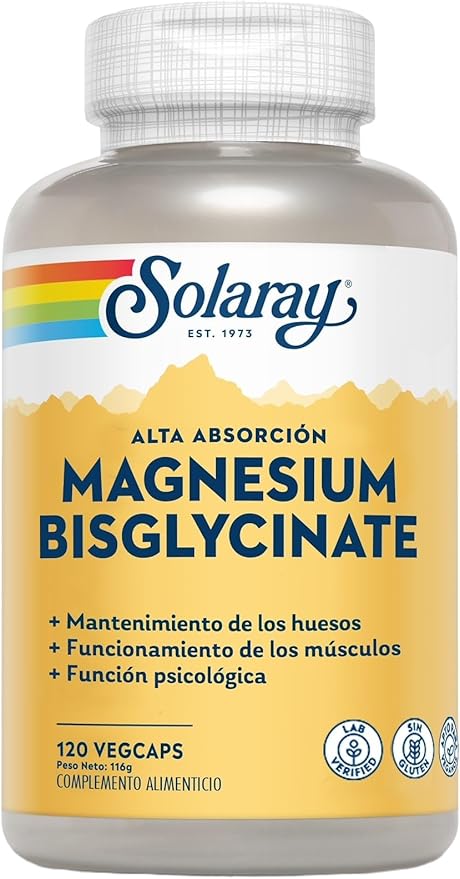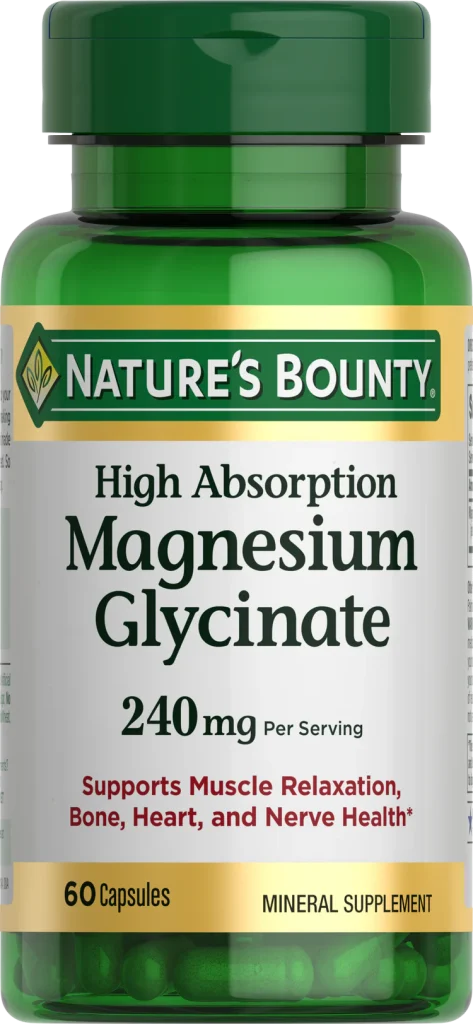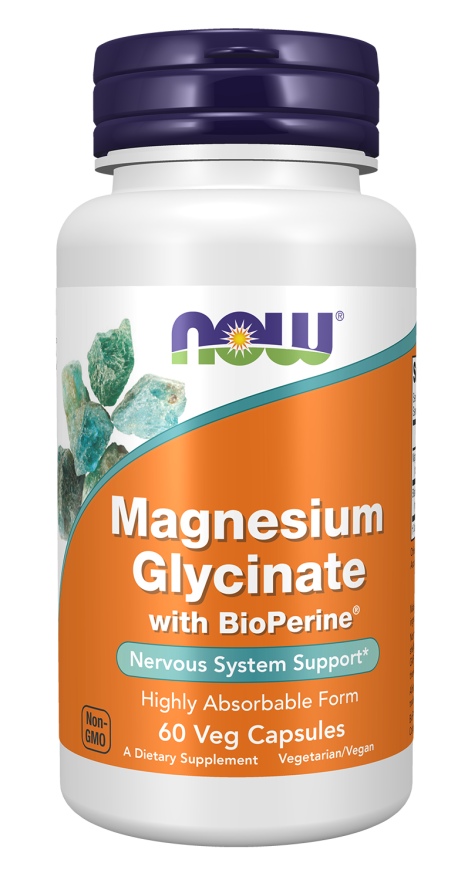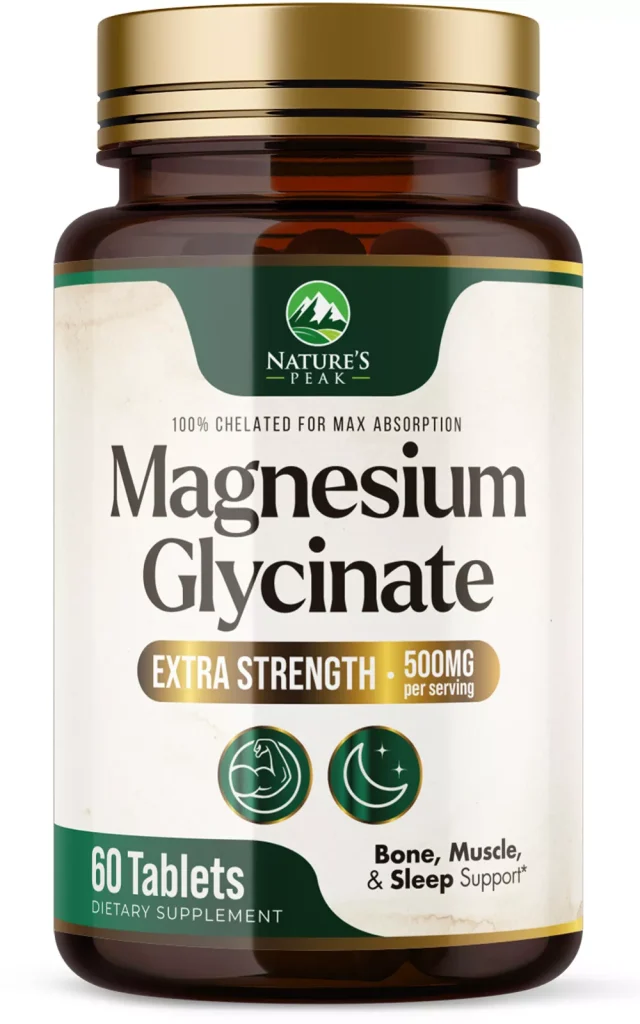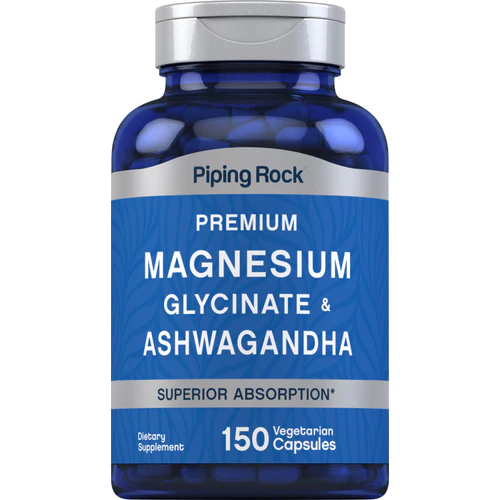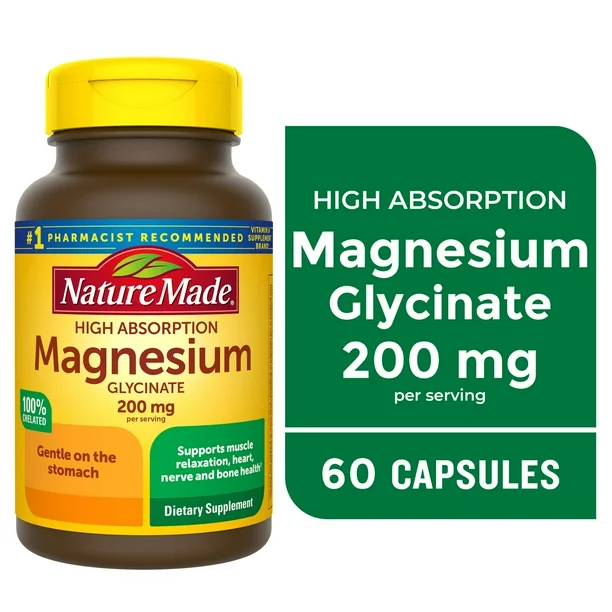What’s Magnesium Glycinate ?
Many types of magnesium supplements are available on the market. Magnesium oxide is the most affordable, but your digestive system doesn’t absorb it well. It’s most commonly used to relieve heartburn or constipation.
Magnesium glycinate is formed by combining elemental magnesium with the amino acid glycine. This form of magnesium is highly bioavailable, meaning the magnesium is easily absorbed through your small intestine.
The benefits of magnesium glycinate
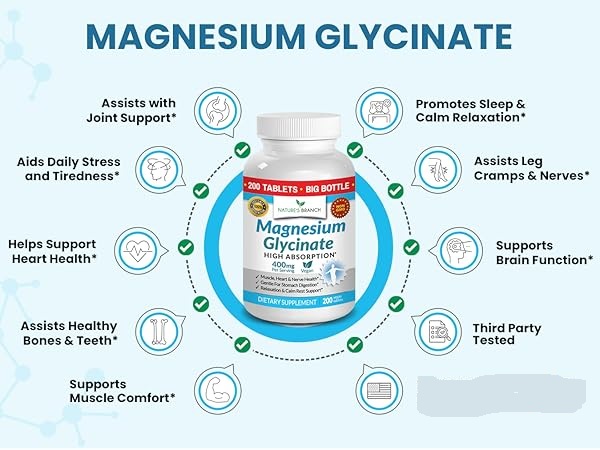
Magnesium glycinate has been shown to have a variety of benefits, including helping to:
- relieve anxiety
- promote bone health
- manage blood sugar in people with diabetes and may lower the risk of developing type 2 diabetes
- maintain regular heart rhythms
- reduce symptoms of premenstrual syndrome (PMS)
- amplify exercise performance
- reduce painTrusted Source
According to a 2021 research review, magnesium supplements may help treat fibromyalgia. And a 2016 analysis of studies notes that they might help reduce the risk of stroke, heart failure, and diabetes.
Magnesium Glycinate vs. Citrate
Magnesium glycinate and magnesium citrate are magnesium supplements with different uses. Both can increase magnesium levels.
Magnesium glycinate is commonly used to improve sleep, lessen anxiety, and support bone health, while magnesium citrate is often used to treat constipation and improve digestion and bowel regularity.
Magnesium glycinate may be less likely to cause stomach issues, such as diarrhea, than magnesium citrate. Talk to a healthcare provider about choosing the right magnesium supplement for you.
How Much Should I Take?
Adults need between 310 and 420 mg of magnesium per day, depending on their age and sex. This recommendation is for total dietary intake, including magnesium found naturally in food.
The tolerable upper intake level (UL) refers to the maximum amount of a supplement you can take per day. For magnesium supplements, the UL is 350 mg. Only take doses higher than 350 mg if prescribed by a healthcare provider.
Magnesium glycinate is available in capsule, liquid, and chewable forms and can be taken with or without food, at any time of day, and in single doses or multiple doses throughout the day.
Potential Drug Interactions
Magnesium glycinate may reduce absorption or interact with some commonly prescribed medications. These include:
- Antibiotics: Take antibiotics two hours before or at least four hours after taking a magnesium supplement.
- Blood pressure-lowering drugs: Check with a healthcare provider before taking magnesium glycinate, especially in high doses, if you take drugs to lower your blood pressure.
- Osteoporosis medications: Take these medications at least two hours before or after taking a magnesium supplement.
Certain medications can deplete the body’s magnesium stores by increasing excretion through the urine. Diuretics, diabetes medications like metformin, and drugs that treat acid reflux can increase the risk of magnesium deficiency.
Side Effects of Magnesium Glycinate
Magnesium glycinate is less likely to cause side effects, such as gastrointestinal distress, than other forms of magnesium. Taking high doses of any kind of magnesium can lead to symptoms such as:3
- Abdominal pain
- Diarrhea
- Nausea
Make an appointment with a healthcare provider if you have questions about magnesium glycinate dosing.
Uses of Magnesium Glycinate
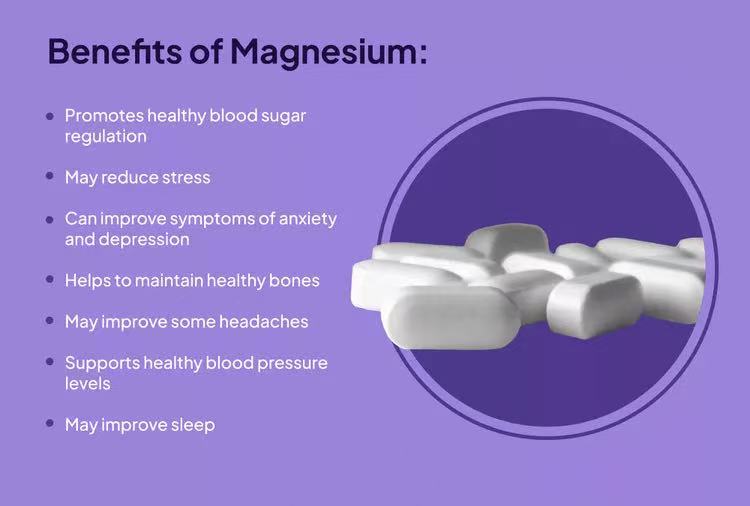
Magnesium glycinate has several uses. Talk to a healthcare provider before starting a new supplement.
1.Helps Manage Blood Sugar
Low blood levels of magnesium can negatively affect the body’s ability to manage blood sugar. People with high blood sugar, such as those with diabetes, are more likely to develop low magnesium. You may lose magnesium by frequently urinating and taking certain medications.
2.May Decrease Risk of Heart Disease
Magnesium may improve the function of the heart muscle to regulate heart rhythm. This can help prevent arrhythmia, or when the heart beats too fast or too slow.
3.May Improve Sleep
Magnesium glycinate may improve sleep quality in those with sleep disturbances. Magnesium binds to and increases the gamma-aminobutyric acid (GABA) receptor activity, a neurotransmitter that promotes sleep.
4.May Lower Blood Pressure
Maintaining optimal magnesium levels is essential for healthy blood pressure. Magnesium promotes the release of nitric oxide, which helps relax blood vessels and maintain blood pressure.
5.May Reduce Muscle Soreness
Magnesium glycinate may help reduce sore muscles and help with muscle recovery. Magnesium plays a role in delayed onset muscle soreness (DOMS) after training. One review found that magnesium glycinate can reduce muscle soreness and improve performance.
6.May Relieve Anxiety and Stress
Having low blood levels of magnesium may worsen stress and anxiety symptoms.
Magnesium supplements could potentially improve subjective anxiety symptoms, but more high-quality studies are needed to fully understand how magnesium glycinate supplements may benefit people with anxiety.
7.May Support Bone Health
Magnesium is an essential mineral for bone health, especially for older adults. It helps form bones and increases bone mineral density, which can prevent osteoporosis, a condition characterized by brittle and weak bones that can fracture easily.
8.May Treat Depression
Magnesium glycinate may help reduce depression symptoms in some people.
A study published in 2022 included people with major depressive disorder who took 250 milligrams (mg) of magnesium, along with an antidepressant drug, daily for six weeks. The participants reported reductions in depression symptoms starting in the fourth week of treatment.
Natural sources of magnesium
Magnesium is found in various foods.
The best sources of magnesium are unprocessed foods such as:
- dark green, leafy vegetables, such as Swiss chard and spinach
- nuts and seeds, such as pumpkin, chia, and sesame seeds
- seaweed
- beans and lentils
- whole, unrefined grains
- fruits, such as bananas, dried figs, and blackberries
- fish, especially halibut
These soils contain the highest concentration of nutrients and minerals.
Produce is often grown in soil that doesn’t contain important nutrients. As a result, some fresh produce may lack minerals, including magnesium.
The bottom line
Magnesium is an important mineral that helps your body function properly, especially concerning your muscular system, bones, and nervous system.
You can get most of your recommended amount of magnesium from your daily diet by including a variety of green leafy vegetables, beans, lentils, seeds, and nuts as often as possible.
If you can’t get enough magnesium from diet alone, talk with a healthcare professional about supplementing with magnesium glycinate. It can be a gentle and efficient way of introducing additional magnesium into your body.
Magnesium Glycinate as Supplement in the market
